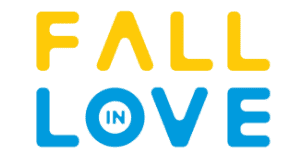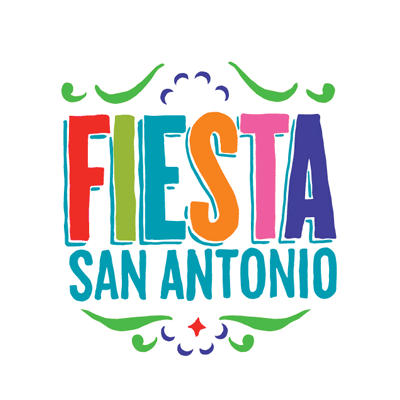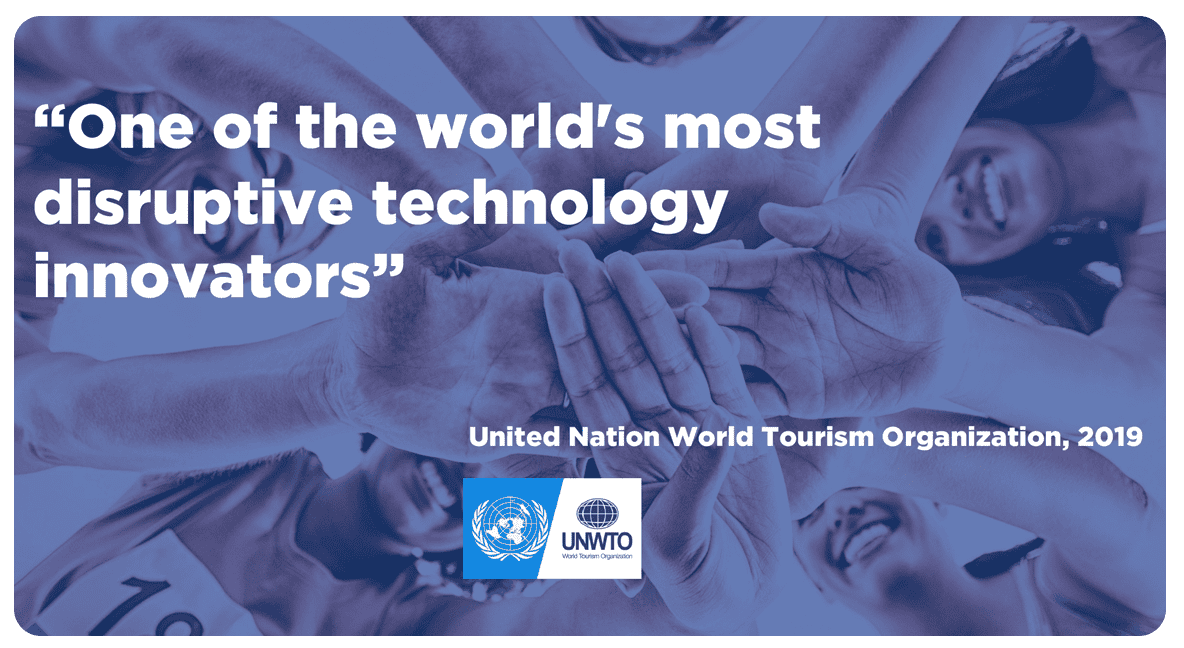Successful Festivals Combine Ticketing and
Wearable Payments for Amazing Shows
Wearable Payments for Amazing Shows
Cashless Payments for Festivals
Successful festivals generate 60% of their revenue from in-event cashless payments. Start using our solution in minutes. Everything you need to set up Oveit Pay is a smartphone and internet connection. Contact us now and upgrade your festival with cashless payments.
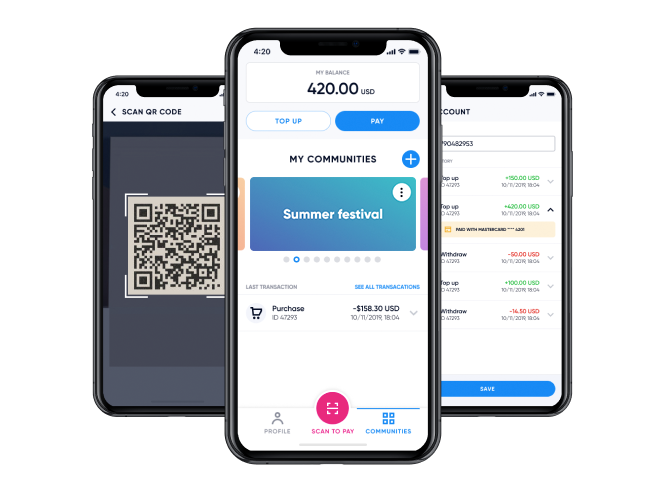
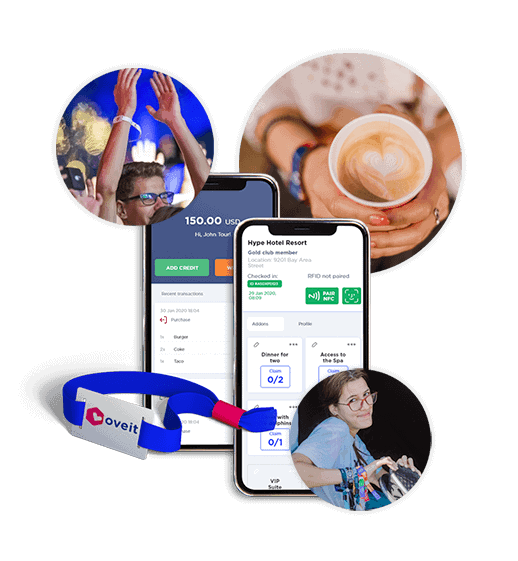
What are cashless payments for festivals?
Mid-sized and large festivals provide both entertainment and a place where visitors can meet and purchase from local vendors. During your festival, visitors will purchase food, beverages, fashion, and many other goods. One way of accepting payments for these goods is via cash and/or traditional card payments. The best one for you, your visitors and your vendors is closed loop cashless payments.
Closed loop cashless payments are a great way to turbo-charge your festival economy. It helps your guests top up a virtual account, used to purchase goods from festival vendors. The topup can be done before the event, when tickets are purchased or during the event, at topup points or using our digital wallet.
The virtual account can be accessed via NFC/RFID wristbands or cards. In some cases, the payments can be done via mobile wallets on the visitor’s phone. Oveit provides you with both the NFC/RFID wristbands and cards, as well as the cashless payment system that makes them work. This is Oveit Pay.
To allow the transactions to happen, the vendors need to have a special app installed on smartphones. This app allows them to keep track of the products they sell, charge customers and see detailed reports of their sales. This is the Oveit POS (Point of Sale) app.
With the help of our cashless payments technology for festivals you can easily onboard vendors, allow customers to pre-topup their virtual wallet, and process payments in your festival. When the event is done, based on the real-time reports, you can clear transactions with your vendors and retain your festival’s commission or fee.
This is just one example of the advantages you get when implementing cashless payments at your festival. With the right system to connect them, your vendors and visitors become a vibrant and active economy, which you can tap into for revenue and data.
Let’s Make Things Happen
Ready to transform your festival payments and guest experiences? Connect with us today to explore how Oveit can help you boost sales, streamline operations, and delight your visitors. Together, we’ll create unforgettable experiences!
“It has more features than I ever dreamed of. Very easy setup. Any suggestion I sent to customer service was implemented within a day or so.”
Mike C.
Founder
Benefits of using cashless payments at my festival
- Easy to use: cashless payments are easy to use and implement. Most festival-goers are already accustomed to RFID wristbands used for access control and payments. They will find using Oveit Pay natural;
- Generate more revenue: with cashless payments, you can tap into the vast economy that is created within your festival by visitors and vendors. You don’t have to rely on an estimate, you can get the exact sales reports and partner with your vendors. This way you can both benefit.
- Get access to data: with cashless payments, festivals can easily get insights into the full visitor experience. You can understand everything in terms of customer behaviour from the moment they’ve landed on your website, to when they’ve arrived in the venue, to the purchases they’ve made. It even extends to the money still left on the wristbands when the festival is done.
- Personalise customer experiences: with cashless payments, you control the event’s economy. You can incentivise a visit to a sponsor with free topups or you can create contests where visitors earn virtual wallet prizes. You can topup a certain amount of money to your VIP guests or you can offer limited discounts to partner vendors. It’s amazing what you can build when you run your own cashless payments solution at the festival.
- Empower your vendors to easily sell more: with cashless payments, vendors can earn more and understand more about what works for them. They have access to real-time stats and they can quickly accept payments, with a mobile-app POS.

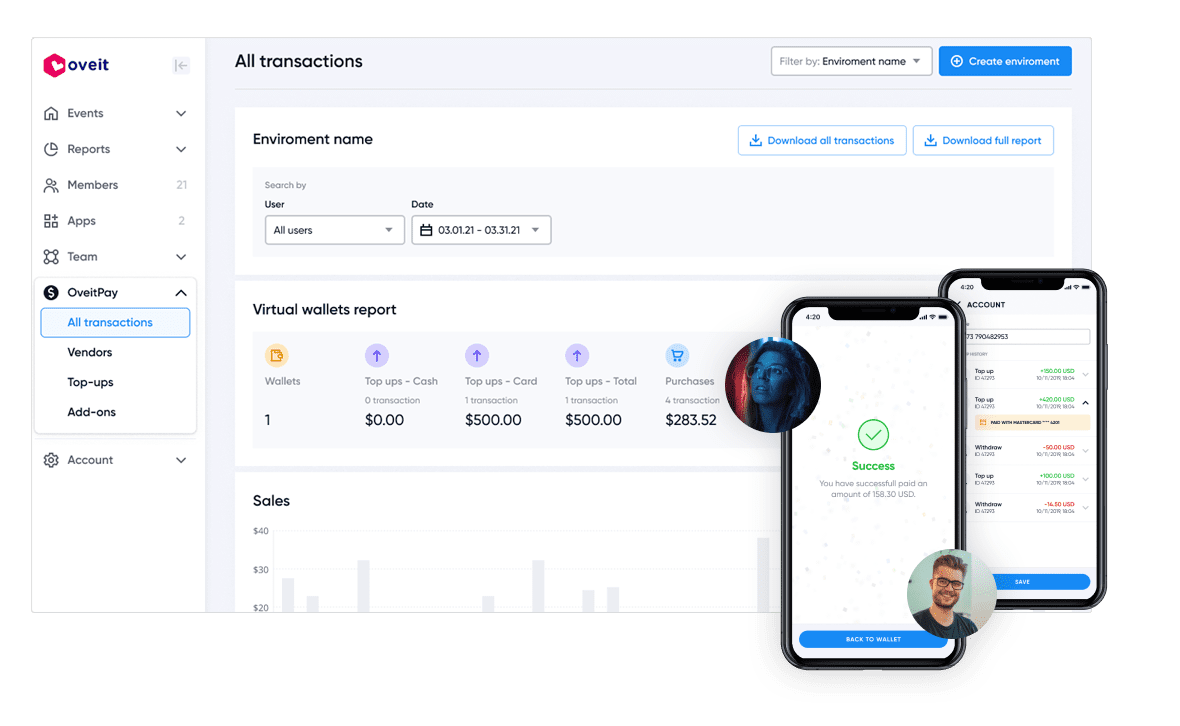
Real-time reporting for cashless payments at festivals
We know just how important reporting is, especially with festivals. With our cashless payments solution for festivals, you get real-time reporting. This way you get a bird’s eye view of everything happening in your festival at any time. You can see sales, aggregated by vendor or types of product, individual sales, topup details, and more. If needed, your vendors can receive access to their individual accounts. This way they can get a clear understanding of how much visitors are spending with them and on what.
Frequently asked questions about festival cashless payments

Bringing your team together: how does our cashless payment system work at festivals?
Oveit Pay is a world leader in cashless payments solutions for festivals and attractions. Our system brings together festival owners, local vendors, visitors, and sponsors. You can use it in a multitude of setups but our most popular use cases are:
Setting up cashless payments:
1. How to onboard visitors in the cashless payments system at your festival?
When you are managing a midsize or large festival, crowd management is crucial. Onboarding visitors, handling wristbands distribution and cashless payments onboarding need to be straightforward. That’s why you can easily onboard customers in two ways:
- Allow for prior topup: in this case, the user registers online through a ticketing platform (Oveit or any other system) and receives their cashless payments wristband at the event. Their ticket is scanned on arrival and paired with an RFID wristband or card. This way the funds pre-topped up are moved to the wristband and the user starts with a preloaded balance. In this case, the wristband is activated when the ticket and wristband are paired.
- Allow for topup on the location: this is a much faster onboarding process and allows for RFID wristbands to be handed out, without a prior matching between tickets and wristbands. This greatly reduces the time spent onboarding. Wristbands are activated when the visitor first tops up their balance.


2. Onboarding vendors into your festival
When handling cashless payments for festivals, one of the main tasks is onboarding vendors in your event. This should be done within a reasonable time prior to the event, with enough time for the vendors to get accustomed to the system and add their product menus. You can invite them straight from your Oveit Pay user admin panel, by just entering their email. Afterwards – they sign up, fill in their details and they’re allocated to your event. If you happen to manage more than one event on Oveit, they will only get access to the event they were invited to.
Vendors get access to both an analytics dashboard and the mobile POS. Using these two interfaces they will be able to add products, view reports, and accept payments in your festival.
One thing to note is that vendors don’t have to be external. If you are handling vending points within your event, these accounts can be set to be operated by your staff. Oveit becomes a team tool for all your staff to use and enjoy.
3. Adding topup stations for cashless payments
When handling cashless payments for festivals, one of the main tasks is onboarding vendors in your event. This should be done within a reasonable time prior to the event, with enough time for the vendors to get accustomed to the system and add their product menus. You can invite them straight from your Oveit Pay user admin panel, by just entering their email. Afterwards – they sign up, fill in their details and they’re allocated to your event. If you happen to manage more than one event on Oveit, they will only get access to the event they were invited to.
Vendors get access to both an analytics dashboard and the mobile POS. Using these two interfaces they will be able to add products, view reports, and accept payments in your festival.
One thing to note is that vendors don’t have to be external. If you are handling vending points within your event, these accounts can be set to be operated by your staff. Oveit becomes a team tool for all your staff to use and enjoy.


4. Handling remaining balances for festival cashless payments
Most festival visitors have remaining balances when the festival is done. There are several ways you can tackle this using Oveit Pay:
- Automatically send remaining funds back when the event is done: this is possible if the customer has initially generated a transaction in our system using a credit card. This can be an initial ticket purchase or topup. Once the event is done, Oveit Pay automatically releases funds back to your customer, when you instruct the system to, as long as you have enough available funds in your account.
- Refund payments in cash: Oveit displays funds in real-time in your topup point viewing interface. In this scenario, visitors head over to the topup stations and withdraw their funds. Your staff can scan the wristband, refund the remaining funds and clear the virtual account.
- Allow visitors to use the remaining balance with another of your events: whether your festival is part of a larger network or you want to allow your customers to use the funds with next year’s event, you can do this with Oveit Pay.
5. Going beyond the festival gates – extend cashless payments in the community
At Oveit we believe that the best experiences are the ones that are great for visitors, organizers, vendors, and of course, the local community. Most festivals create amazing experiences inside the festival venue. However, many communities offer local attractions that can help visitors extend their experiences beyond the festival. Your guests will have to find accommodations, dine and shop outside the festival space. Unless you’re handling the Burning Man festival in which case – do call us.
In a recent study, it was found that most communities would greatly benefit from festival visitors if the payment infrastructure would allow them to connect with them. In this case, visitors would have fun and spend time at the event but at the same time they would discover the local attractions, book hotel stays, and contribute to the local economy by purchasing outside the festival.

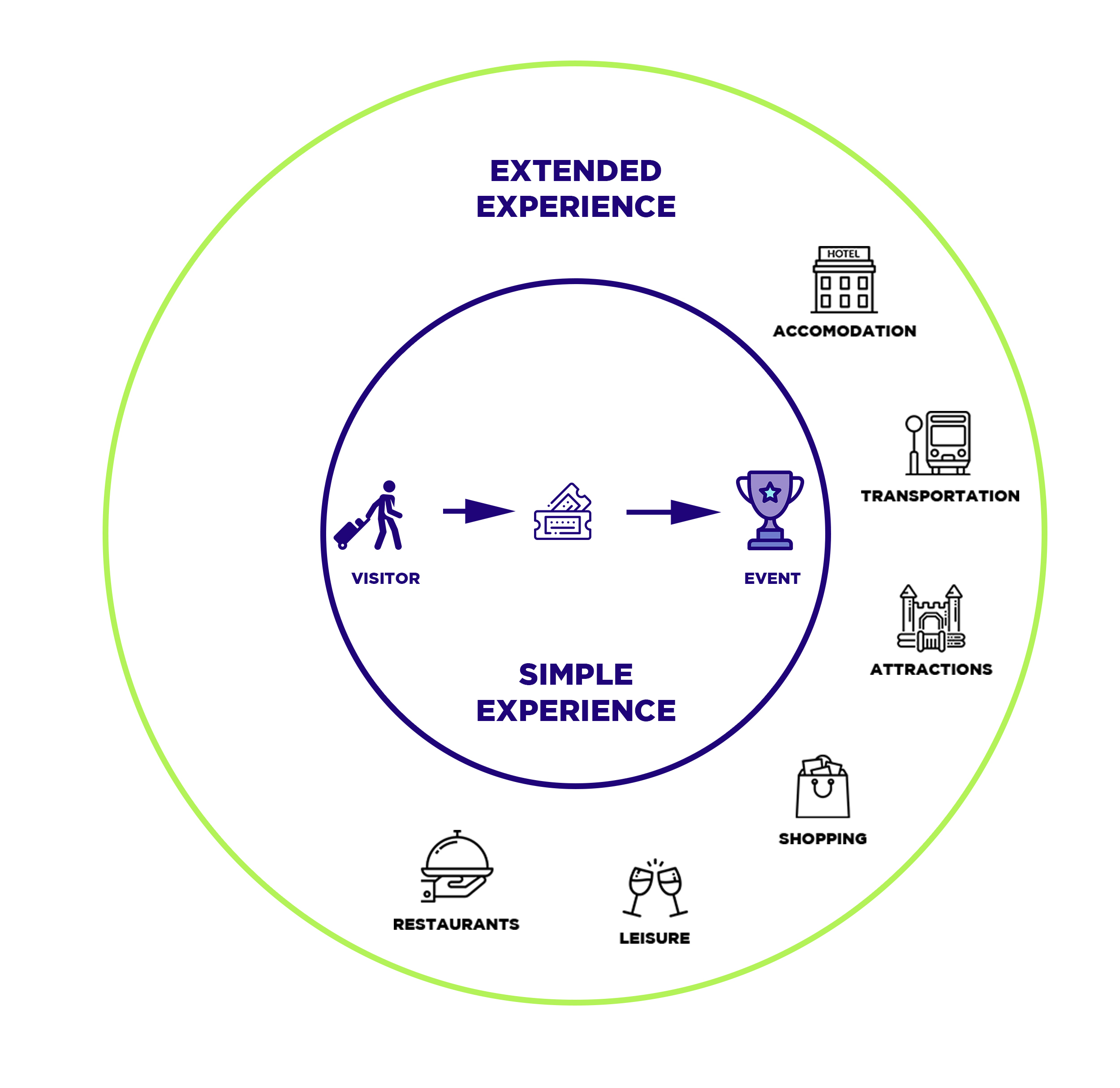
For a long time, this would have been counterproductive to the festival’s earnings. But now, with Oveit, you can help visitors connect with the local attractions and accommodations and generate more revenue for yourself, as well as relevant data. With Oveit you can take your closed loop payments system and extend it to your local partners:
- Hotels and accommodation: allow guests to use their RFID wristband to check in the hotel, which can be pre-purchased as a ticket addon.
- Restaurants and bars: partner with local restaurants and bars, invite them in the cashless payment system and they can accept festival payments, even if they are not a part of the festival. All they need is a smartphone device and they can accept payments from your guests.
- Local producers of goods and services: give the guests a chance to discover local manufacturers and businesses and allow them to help the local economy.
- Tour operators and guides: arrange outside-the-festival experiences while still allowing your guests to feel safe – there is no need to carry cash if they are using the cashless payments wristbands from your festival.
A few days at the festival is fun but extending your visitors’ experience outside the festival can create a lifetime memory. Your customers will happily remember their visit and gladly return the following years. Discover more about how you can build an economy around your event.
Festival Ticketing Software: Seamless Access, Endless Possibilities
Oveit’s ticketing platform is designed to revolutionize the way festivals manage attendees while offering an unmatched experience for guests. From flexible ticketing operations to personalized add-ons, we make ticketing smarter, faster, and more engaging.
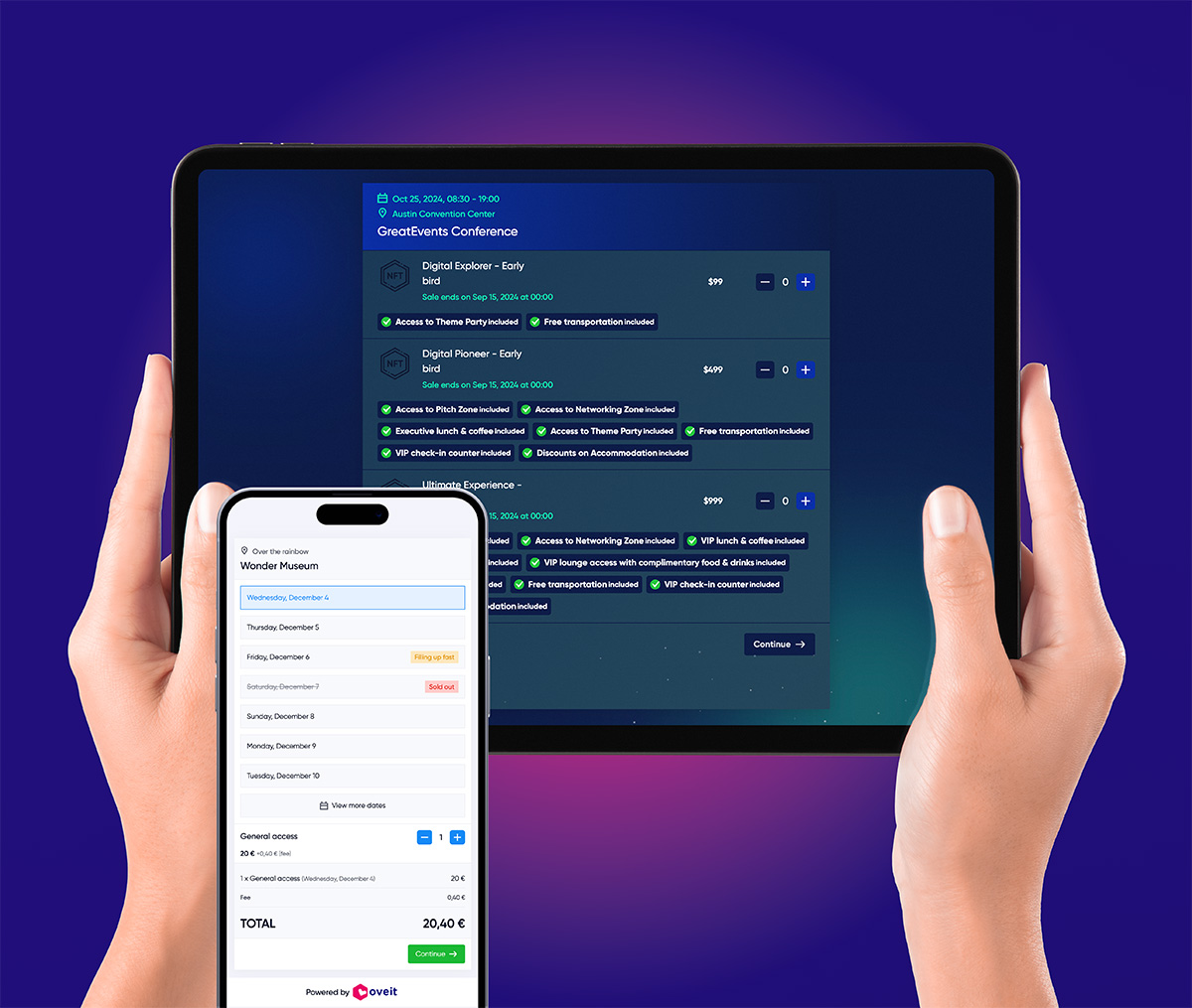
Effortless Ticketing Operations
- Flexible Ticket Types: Offer single-day, multi-day, VIP, or group tickets tailored to your audience.
- Real-Time Management: Track sales, validate entries, and manage tickets in real-time.
- Omnichannel Integration: Sell tickets directly on your website, social platforms, or third-party platforms.
Pre-Event Add-Ons To Increase Revenue
Enhance the guest experience even before the festival begins!
- Allow attendees to purchase parking passes, meal vouchers, merchandise, or even exclusive backstage tours.
- Simplify logistics by bundling add-ons with their tickets for a one-click solution.
Cashless Top-Ups for a Frictionless Festival
With Oveit, your attendees can top up cash to their accounts ahead of time, ready to spend seamlessly using wearables such as NFC bracelets or festival badges.
- Faster Transactions: No need for wallets or cards—payments are instant and hassle-free.
- Spending Insights: Attendees can track their balances and purchases through our app or their online profile.
- Automatic Refunds: Simplify unused credit returns post-event.
Personalization and Discounts
Make every ticket personal.
- Guests can customize their tickets with names, preferences, or special requests.
- Create exclusive offers and discounts for communities, returning visitors, or loyal fans.
Built-in Community Engagement
Turn ticketing into a community experience.
- Group Deals: Offer discounts for friends or family packages.
- Pre-sale Access: Reward loyal fans with early-bird or VIP access to tickets.
- In-Festival Activities: Use attendee data to invite them to personalized activities or special areas.
Streamlined CheckIn Process
Oveit’s platform makes check-in faster and more efficient, ensuring a smooth entry experience for both attendees and staff.
- Use QR code scanning or NFC-enabled devices for rapid ticket validation.
- Avoid long queues with automated attendee flow management.
- Integrate multiple entry points while maintaining real-time tracking
Data-Driven Insights and Reporting
Gain valuable insights into your festival’s performance with Oveit’s powerful analytics tools.
- Analyze attendee behavior, ticket sales, and cashless spending patterns.
- Create customized reports to measure ROI and identify growth opportunities.
- Use real-time data to make adjustments during the event, maximizing success.
Scalable for Festivals of All Sizes
Whether hosting a boutique event or a multi-day music festival, Oveit grows with you.
- Handle high-volume ticket sales and cashless transactions effortlessly.
- Adapt ticketing options, payment systems, and add-ons to fit your evolving needs.
- Ensure a consistent, professional experience for festivals of any scale.
Your Example Festival Ticketing Below:
Enter codes “mysponsor” and “magic25”
to discover some hidden gems:
30-60%
Increase in Sales
#1
Most Innovative Startup
United Nations World Tourism Organization – 2019
+15% YoY
Spend per visitor
Frequently Asked Questions: Festival Ticketing with Oveit

Oveit is a very useful platform that simplifies a lot the ticketing actions and registration process for our business event. It is swift and easy to use for everyone, even without technical knowledge. The features we needed and didn’t existed at some point were quickly developed and implemented.
Ioana A
Growth Marketing Management


